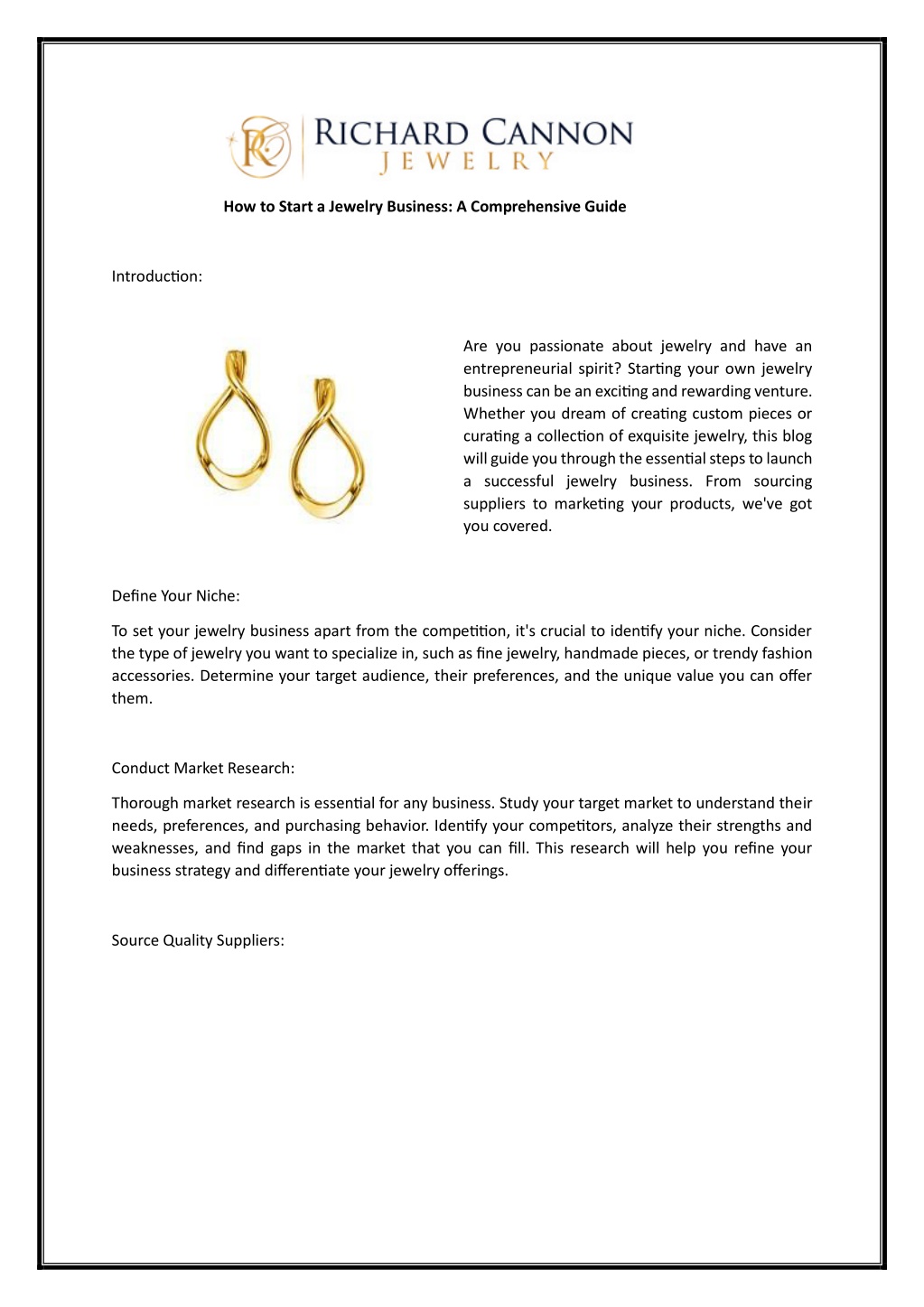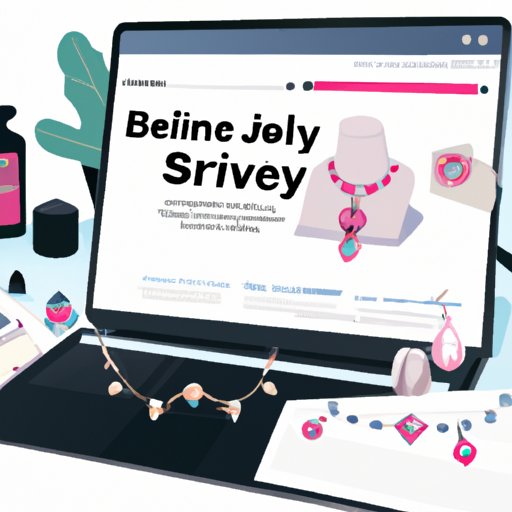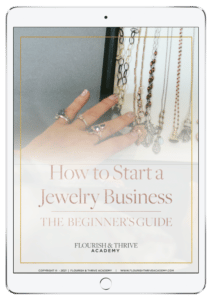Launching a Jewelry Business: A Comprehensive Guide
Related Articles: Launching a Jewelry Business: A Comprehensive Guide
Introduction
In this auspicious occasion, we are delighted to delve into the intriguing topic related to Launching a Jewelry Business: A Comprehensive Guide. Let’s weave interesting information and offer fresh perspectives to the readers.
Table of Content
Launching a Jewelry Business: A Comprehensive Guide

The allure of jewelry has captivated humanity for millennia. From ancient civilizations adorning themselves with precious stones and metals to modern society’s fascination with intricate designs and sparkling gems, the appeal of jewelry transcends time and culture. This enduring fascination presents a compelling opportunity for entrepreneurs seeking to establish a successful business. Launching a jewelry business, however, requires a meticulous approach and a comprehensive understanding of the industry’s nuances.
The Allure of the Jewelry Industry
The jewelry industry offers a unique blend of artistry, craftsmanship, and business acumen. Its appeal stems from several factors:
- Emotional Connection: Jewelry often holds sentimental value, serving as a symbol of love, commitment, and personal style. This emotional connection fosters strong customer loyalty and a willingness to invest in high-quality pieces.
- Evergreen Demand: Jewelry is a timeless commodity. Whether it’s for special occasions, everyday wear, or investment purposes, the demand for jewelry remains consistently high, making it a relatively stable industry.
- Diverse Market: The jewelry market encompasses a wide range of price points, styles, and materials, catering to a diverse clientele. This allows for niche specialization and targeted marketing strategies.
- Creative Expression: Jewelry design offers boundless opportunities for artistic expression and innovation. The ability to create unique pieces that resonate with customers can be both rewarding and lucrative.
Exploring Business Models: Options for Launching a Jewelry Business
The jewelry industry offers various business models, each with its own advantages and challenges. Understanding these models is crucial for determining the best fit for your vision and resources.
1. Retail Jewelry Store:
- Concept: Owning a physical retail store allows for direct interaction with customers, showcasing merchandise in a curated environment, and building brand recognition within a local community.
- Advantages: Control over branding and merchandising, personalized customer service, potential for community engagement.
- Challenges: High initial investment, overhead costs (rent, utilities, staffing), competition from online retailers.
2. Online Jewelry Store:
- Concept: Establishing an online store allows for global reach, lower overhead costs, and flexibility in operating hours.
- Advantages: Scalability, reduced overhead, wider market reach, convenient shopping experience.
- Challenges: Competition from established online retailers, reliance on high-quality product photography and website design, managing logistics for shipping and returns.
3. Wholesale Jewelry Supplier:
- Concept: Focusing on wholesale sales involves manufacturing or sourcing jewelry and selling it to retailers, boutiques, or other businesses.
- Advantages: Higher volume sales, potential for bulk discounts, reduced marketing costs.
- Challenges: Building strong relationships with retailers, managing inventory and distribution, maintaining consistent quality.
4. Jewelry Designer/Maker:
- Concept: Creating and selling unique jewelry pieces directly to customers, often through online platforms, craft fairs, or pop-up shops.
- Advantages: Creative freedom, direct control over pricing and branding, potential for high profit margins.
- Challenges: Building a customer base, marketing and promotion, managing production and inventory.
5. Jewelry Repair and Restoration:
- Concept: Offering services like jewelry cleaning, repair, resizing, and restoration to both individuals and retailers.
- Advantages: Lower initial investment compared to retail or wholesale, niche market specialization, recurring revenue stream.
- Challenges: Acquiring specialized skills and equipment, marketing services effectively, managing customer expectations.
Essential Considerations for Launching a Jewelry Business
1. Business Plan Development:
- A detailed business plan is essential for outlining your vision, target market, financial projections, marketing strategies, and operational procedures. It serves as a roadmap for your business’s success.
2. Market Research and Analysis:
- Thorough market research is crucial for identifying your target audience, understanding their preferences, and analyzing the competitive landscape. This research will inform your product offerings, pricing strategies, and marketing campaigns.
3. Sourcing and Manufacturing:
- Determine your sourcing strategy, whether you will manufacture jewelry in-house, source from wholesale suppliers, or collaborate with artisans. Evaluate factors like quality, cost, production time, and ethical sourcing practices.
4. Legal and Regulatory Compliance:
- Familiarize yourself with local and national regulations related to jewelry manufacturing, sales, and labeling. Obtain necessary licenses and permits to operate legally.
5. Inventory Management:
- Develop a system for managing inventory effectively, tracking stock levels, predicting demand, and preventing stockouts. This ensures smooth operations and customer satisfaction.
6. Pricing Strategy:
- Consider factors like material costs, production expenses, overhead costs, and market competition when setting your pricing. Implement a pricing strategy that balances profitability with customer value.
7. Marketing and Promotion:
- Develop a comprehensive marketing plan that leverages digital marketing (website, social media, online advertising), traditional marketing (print media, local events), and public relations.
8. Customer Service:
- Deliver exceptional customer service to foster loyalty and positive word-of-mouth referrals. Implement systems for handling inquiries, resolving issues, and providing post-purchase support.
9. Financial Management:
- Maintain accurate financial records, track expenses, and monitor cash flow. Secure funding if necessary, and develop a sound financial management system to ensure long-term sustainability.
10. Website and Online Presence:
- Invest in a professional website that showcases your products, brand story, and customer testimonials. Optimize your website for search engines (SEO) and utilize social media platforms to engage with potential customers.
Frequently Asked Questions (FAQs)
1. What are the startup costs for launching a jewelry business?
Startup costs vary significantly depending on the business model, scale of operations, and location. Costs include:
- Legal and Regulatory Fees: Licensing, permits, and legal consultations.
- Equipment and Supplies: Jewelry-making tools, display cases, packaging materials.
- Inventory: Raw materials, finished products, or wholesale purchases.
- Marketing and Advertising: Website development, social media campaigns, print materials.
- Rent or Lease: For a physical store or studio space.
- Insurance: Business liability, product liability, and other relevant insurance.
2. What are the key challenges facing jewelry businesses today?
Challenges include:
- Competition: From established retailers, online marketplaces, and independent designers.
- Evolving Consumer Preferences: Keeping up with changing trends and customer demands.
- Economic Fluctuations: Impact on consumer spending and demand for luxury goods.
- Supply Chain Disruptions: Global events and economic factors affecting material sourcing and production.
- Sustainability Concerns: Increasing consumer demand for ethical and environmentally responsible practices.
3. What are some tips for creating a successful jewelry business?
- Focus on a Niche: Specialize in a particular style, material, or target audience to differentiate your brand.
- Develop a Strong Brand Identity: Create a unique brand story, logo, and aesthetic that resonates with your target market.
- Invest in High-Quality Products: Use durable materials, skilled craftsmanship, and attention to detail to create lasting value.
- Build a Strong Online Presence: Invest in a user-friendly website, optimize for SEO, and engage with customers on social media.
- Provide Exceptional Customer Service: Build relationships with customers, offer personalized experiences, and address concerns promptly.
- Stay Updated on Industry Trends: Attend trade shows, read industry publications, and network with other jewelry professionals.
Conclusion
Launching a jewelry business is a rewarding endeavor that combines creativity, craftsmanship, and entrepreneurship. By carefully considering the various business models, conducting thorough market research, and implementing a comprehensive plan, aspiring jewelry entrepreneurs can navigate the challenges and capitalize on the industry’s enduring appeal. With a passion for jewelry, a keen understanding of the market, and a dedication to delivering exceptional value, a jewelry business can flourish and leave a lasting impression in the world of fashion and style.








Closure
Thus, we hope this article has provided valuable insights into Launching a Jewelry Business: A Comprehensive Guide. We hope you find this article informative and beneficial. See you in our next article!